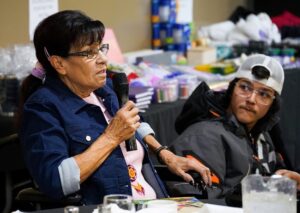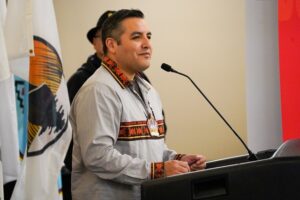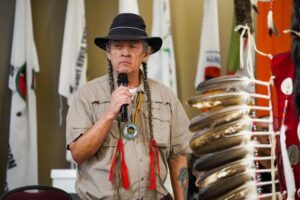B’Maakonigan and Anishinabek Nation host Anishinaabe Dodemaag Teachings

By Rick Garrick
LITTLE CURRENT — Building an understanding of the Anishinaabe Dodemaag System of Governance was the focus of the Anishinabek Nation’s Anishinaabe Dodemaag Teachings gathering on March 28-29 at the Manitoulin Hotel and Conference Centre in Little Current. Hosted by the Anishinabek Nation and B’Maakonigan, the central governing body for the First Nations that have signed the Anishinabek Nation Governance Agreement and others that sign on in the future, the gathering also featured teachings on how each dodem (clan) was given a sacred gift, law and responsibility; the Dodemaag decision-making process and responsibilities based on the Seven-Pointed Star System; and the relationship and importance of the Anishinaabe Sacred Gifts, Ngo Dwe Waangizid Anishinaabe, and the Anishinaabe Chi-Naaknigewin.
“[The Anishinaabe Dodemaag Teachings] are so important for our children, these little kids that are sitting around here today,” says Zhiibaahaasing Chief Irene Kells. “These are the ones that need to be taught these teachings because that will guide them properly and slowly with respect when they understand the teachings of the past. These were a part of our lives a long time ago, we lived them, there were no questions, we knew the seasons, we knew the clans, our ancestors knew how to look after themselves.”
Kells says it is important to get back on track with learning the teachings so the young people will become stronger as they grow older and become leaders.
“These young people here will be able to stand up and be proud and continue to protect their communities, protect the laws of the land,” Kells says, noting that she attended many of the late Anishinabek Nation Head Getzit Mishomis Gordon Waindubence (M’Shiikenh)-baa’s circles where he shared the Anishinaabe Dodemaag teachings. “It’s a beautiful way of looking at how you do things. It is really interesting and you will see as the days go on that this is a good way to live.”

Anishinabek Nation Grand Council Chief Reg Niganobe says it was deeply meaningful to have Chop Waindubence at the gathering to assist the Anishinabek Nation with its responsibilities in maintaining the knowledge of the original ways by leading the Anishinaabe Dodemaag Teachings.
“We have been incredibly privileged to have your father, M’Shiikenh-baa, with us for so many years to, of course, guide us on our path to becoming one Anishinabek family,” Grand Council Chief Niganobe says. “It means a lot to us that you are here leading these teachings over these next two days. It is so important that we have these opportunities to listen and to share in these teachings because they are at the core of what we are as Anishinabek peoples.”
Grand Council Chief Niganobe says he firmly believes that the Anishinaabe Dodemaag System of governance is the pinnacle of future decision-making for the Anishinabek nations.
“It serves our way of life, which of course focuses on the betterment of our people, and not only that, but the betterment of all our relations,” he says. “The Clan System is inclusive of everyone, it reaches consensus, it holds accountability, and formulates more significant direction in planning for the advancement of our nations and communities. When the Clan System is used to make a decision, we know that all viewpoints are included in the decision and implemented and acted upon by the entire nation.”

Anishinabek Nation Head Getzit Mishomis Richard Assinewai, Wiikwemkoong citizen and member of the Stone Clan, says the Anishinabek knew what to do in the past for whatever was happening in their lives.
“If we can go back and think how it was maybe in our minds, how our ancestors lived the life, they lived a certain way at the time, a very pure and simple way and everything they did, they had it all right,” Getzit Assinewai says. “They knew what to do at any given time, whatever moment, what was going on. Even if someone was sick they knew what to do right away, or if they lost a loved one they knew what to do right away. They didn’t sit there and ponder, they got up and used what they were given to help he or she that has gone on.”
Getzit Assinewai says some Elders from a fly-in community up north once told him about how they had lost their language, traditions, values, and teachings and asked him what they could do.
“All I said was this: ‘Every one of those things you mentioned, the language, the ceremonies, values, traditions, those things are never lost, they are still there,’” he says. “What’s happening is we’re the ones that are lost, it’s us. This morning, we started off with a sacred fire, that fire we saw this morning, that fire you see at ceremonies, at pow wows, that is the exact same fire our ancestors used at one time, same sweetgrass, same smudge. Those things never changed, it’s us, we’re the ones that changed and we need to reconnect.”
Chop Waindubence began his teachings by sharing semaa (tobacco) with a member from each of the clans present at the gathering to ask permission to tell stories and teachings from their clan.
To watch the teachings, please visit the Anishinabek Nation YouTube channel.


